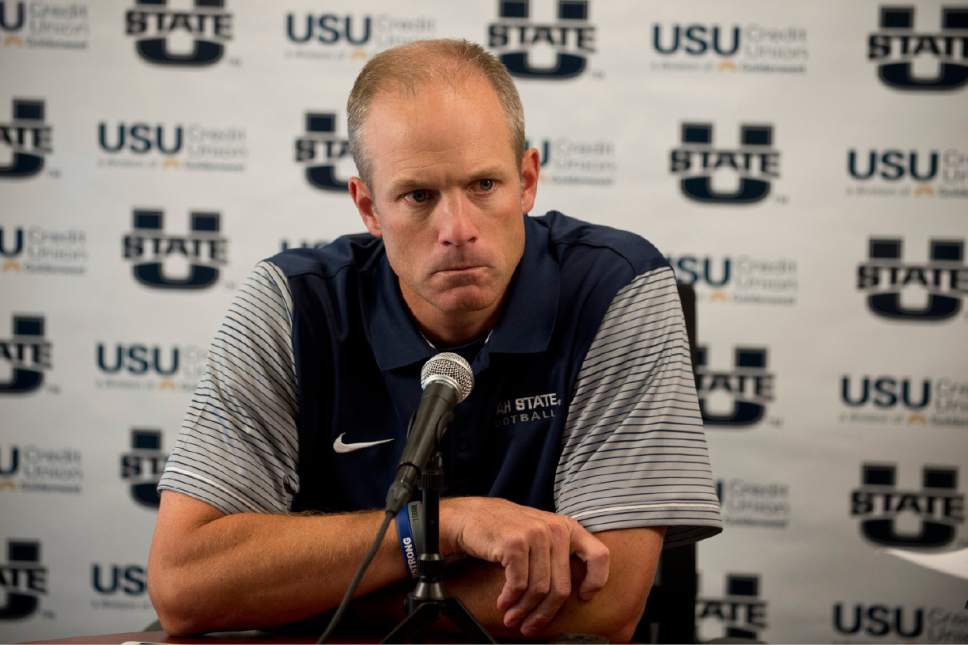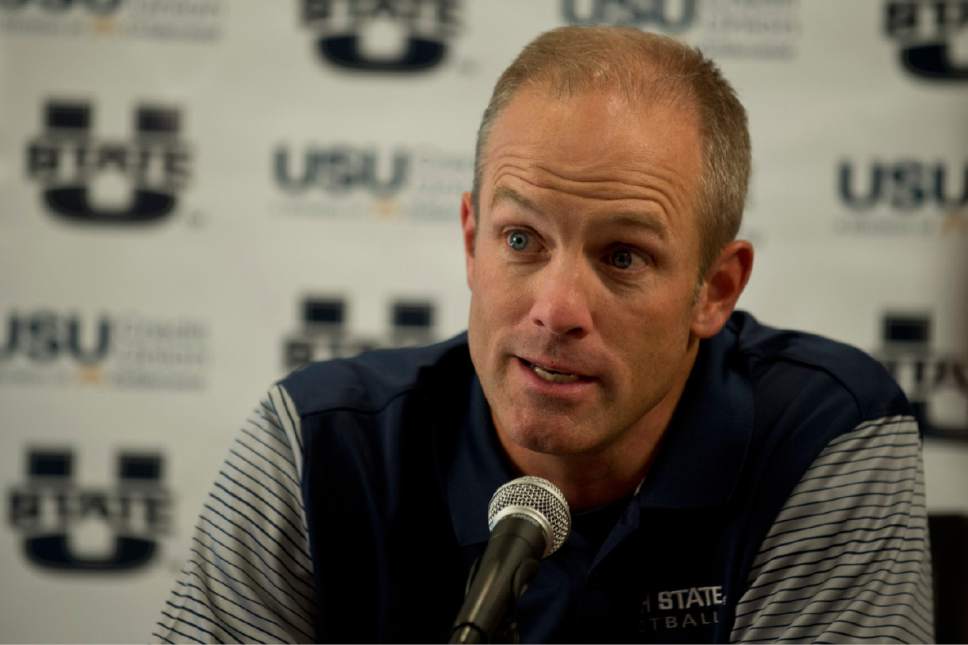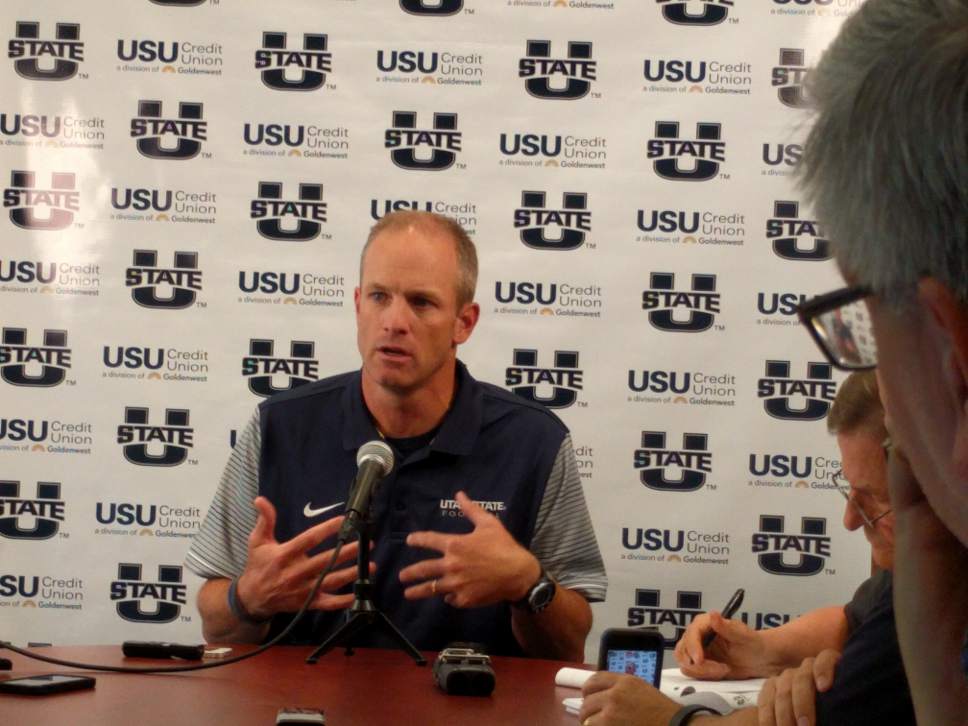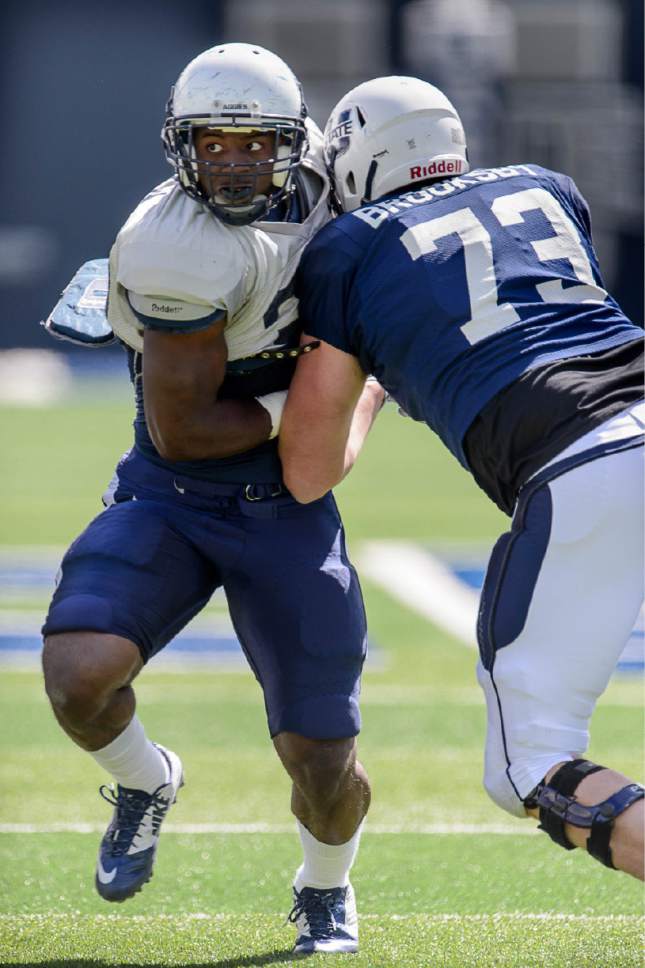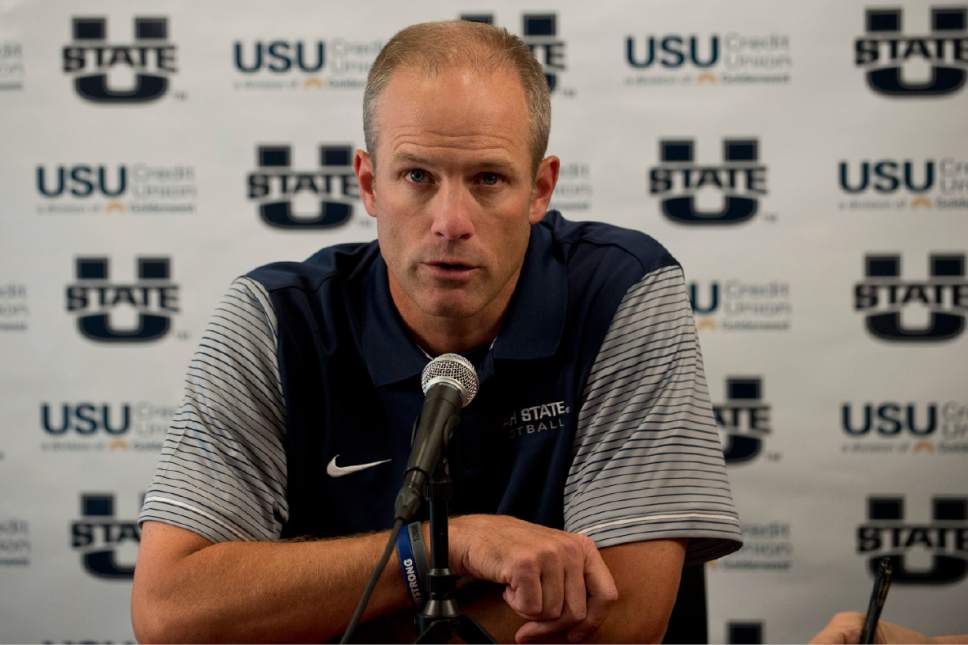This is an archived article that was published on sltrib.com in 2016, and information in the article may be outdated. It is provided only for personal research purposes and may not be reprinted.
Former Utah State University football player Torrey Green was cut from the Atlanta Falcons on Thursday morning after team ownership learned of multiple sexual assault allegations made against him while he was attending school in Utah.
Four women — who didn't know each other — separately reported being sexually assaulted by Green to the Logan City Police Department in 2015. Three of those women were students and also informed school officials.
No charges were filed and the investigations stalled. Prosecutors are now re-examining the cases.
The allegations were first reported by The Salt Lake Tribune last month. Green was not named in that story because The Tribune typically does not identify individuals accused of a crime unless they have been arrested or charged.
The Falcons learned about the accusations Wednesday and waived the linebacker from the team the next morning, owner Arthur Blank told media during Thursday's training camp in Atlanta.
"We don't want anybody connected to the organization who has those kinds of accusations around them," Blank said in a video posted by the Atlanta Journal-Constitution.
Green, who is from California, played all 13 games in Utah State's 2015 season — the same year all four women reported their assaults to police. He signed a free agent contract with the Falcons in April.
Utah State's head coach, Matt Wells, said Thursday that he found out about the allegations within the past week, from the university.
He said such issues usually "go through the chain of command" before they're brought to his attention.
"Those are issues that don't concern me until they get to me," he said during a news conference that was part of the team's media day. "I can react when I find something out."
Wells on Wednesday tweeted "good luck" to Green for training camp. The tweet was removed Thursday.
Green could not immediately be reached for comment. In an interview last month, Green denied the allegations. He also said the school talked to him about one incident, which he did not specify.
He said "everyone makes mistakes" and it was upsetting that The Tribune was pursuing a story given his role in the NFL.
"This isn't just Salt Lake, this isn't just Logan, this isn't just Utah, the whole U.S. is about to hear about something that's blown out of proportion basically and that's going to ruin a young man's career," Green said.
According to the four police reports provided to The Tribune in May, officers contacted Green for just the first two cases.
The first two reports were sent to deputy Cache County Attorney Barb Lachmar for review. She declined to file charges.
Police reports indicate that the second two cases were not forwarded to prosecutors, and that Logan police Detective Kendall Olsen — who handled all four allegations — last attempted to contact any of the women in January.
Lachmar said last month she asked Olsen to send her the cases for review, two days after The Tribune asked for comment on its initial story.
Last week, she said she had received the four cases and is reviewing them, adding that the office is also "doing some additional investigation to assist us in making our final decision."
She said that process will not take months but could take several weeks.
Logan police did not respond to multiple requests for comments. The Tribune also asked for communication about Green between the department and school officials. Police said no communication existed.
Utah State has declined to discuss Green or how it handled the cases, citing privacy.
Under Title IX, a federal law that prohibits sex-based discrimination in education, schools must take action if there is a potential continuing threat to students. But it appears Utah State never fully investigated the allegations against Green.
The three female students — Catherine, Mary and Anna — all went to the school's Sexual Assault and Anti-Violence Information office (SAAVI), which provides confidential counseling, before going to police.
Jenny Erazo, SAAVI coordinator, told The Tribune she would tell the university if she received multiple allegations against the same perpetrator, but would not say if that's what she did in this instance.
But even going to counseling was a difficult feat for the three women: SAAVI is located just north of the stadium complex, so they feared seeing Green any time they went to counseling.
The Tribune does not generally name victims of sex crimes. The four women in this story asked to be identified by partial names or pseudonyms.
In limited conversations with The Tribune, Mary said she scheduled her therapy sessions with Erazo when the football team was in practice.
But one day, their planning didn't pan out. Mary was waiting for a bus in front of the football stadium when the players came walking out.
"I was freaking out," she said. "I had my pepper spray and I was calling my mom."
Then, Erazo pulled up in her car and offered Mary a ride.
Mary, who says she was sexually assaulted in November 2015, said she also told the school's Title IX office about the incident, but later asked the school to stop investigating.
Title IX mandates that universities investigate credible reports that a student has sexually abused multiple students, even without a formal complaint.
Logan police Detective Olsen investigated the case, but Lachmar declined to file charges.
"The football team definitely gets slaps on the wrists and they often don't look at rape as breaking the law, they look at it as an inconvenience to the team," Mary told The Tribune.
Catherine, who said Green raped her in January 2015, didn't report to the Title IX office, but informed her dormitory's resident assistant — who is required to report to Title IX — and the dorm complex's supervisor.
"I wish I would have reported [directly] to the school," she told The Tribune. "Maybe they would have taken it more seriously because he's a football player."
Anna says Green raped her in June, but she did not report to Logan police or to the school until November. After Olsen interviewed her, he transferred her case to North Park police, whose jurisdiction covered where the alleged rape occurred. They say Anna stopped communicating with them and so never moved forward with the case. Anna, however, says she repeatedly tried to get in touch with them, but they never responded.
Anna said she also told someone at the school — someone in the Title IX office, she believes — but that no one got back in touch with her about how to proceed.
"He graduated a month after I reported it to the school," Anna said in an earlier interview. "And now he's playing in the NFL — are you kidding me?"
The fourth victim, Debbie, was not a student, but reported to Logan police that she was raped by Green at a party following the Aggies' November defeat of Nevada in Logan.
At first, Debbie stopped participating in the investigation, but tried to get back in touch with Olsen after Green showed up at her work, she said. She said Olsen never responded.
After the story ran last month, Utah State spokesman Tim Vitale said the school's in-house counsel is leading a review into the allegations.
That review will look at communication between offices that deal with sexual assault, how the school handles anonymous or confidential sexual assault reports and mandatory reporter training.
He did not answer questions about the scope of the inquiry or who would review the findings or act on any recommendations that come out of it.
"We're trying to address this as quickly as we can, and any recommendations will be shared widely with our constituents," Vitale said.
Coach Wells on Thursday said that he and his staff spend "a lot of time educating" players on "different scenarios" both on and off the field.
"It all comes down to the choices we make," he said. "I'm very proud of our track record here, I'm very proud of our players."
Tribune reporter Steve Luhm contributed to this story.
Twitter: @alexdstuckey


